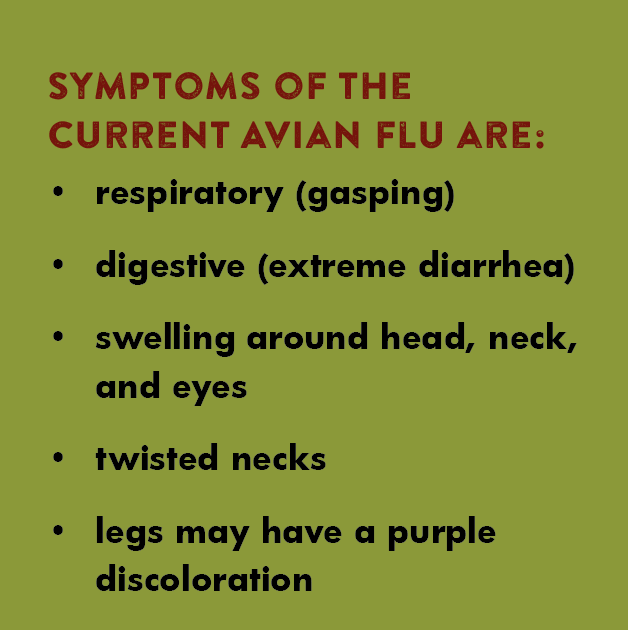
What Back Yard Flock owners Should Know About AVIAN FLU!
Avian Influenza is a common aquatic bird virus that is currently spreading in the United States. It began on the eastern side of the country, but with seasonal bird migrations it has moved West and there are increasing reports of the illness in back yard flocks. While it is not common for the virus to spread to humans, it is not impossible. There have been a few cases of cross-over to humans in commercial poultry operations. Avian Influenza is a common aquatic bird virus that is currently spreading in the United States. It began on the eastern side of the country, but with seasonal bird migrations it has moved West and there are increasing reports of the illness in back yard flocks.
While it is not common for the virus to spread to humans, it is not impossible. There have been a few cases of cross-over to humans in commercial poultry operations. While it isn’t common five types of avian influenza A viruses have been known to transfer to humans (H5,H6,H7, H9 and H10) Specifically A(H5N1) and A(H7H9) are the primary strains causing the bird illness that is currently circulating. If you suspect your flock has been infected it is important to where personal protective equipment (PPE) when dealing with sick or dying birds. The primary source of infection at this time is within water foul populations, however through migratory patterns they have documented significant transmission to backyard and commercial poultry operations. Ducks often do not show symptoms but carry the disease.
H5N1 infections are highly pathogenic which means they are extremely contagious and the disease has a high mortality rate. Studies have shown that this virus affects multiple organs and has a fatality rate of 90-100% in chickens, often within 48- hours of infection. Typically infection occurs when the birds come in contact with feces or saliva from infected birds. If you have free range chickens and live near irrigation that is appealing to water foul, it’s best to try to contain your birds. If a flock is infected it will be culled. There are no management practices at this time other than disposal if a flock is exposed. biosecurity measures you can take to protect your flockKeeping chickens in an enclosure, not free range.Making sure wild birds don’t have access to your chickens, including enclosing the top.If you live near water fowl habitat then keeping birds fully contained is even more important. Remember ducks may not show any sign of illness but are carriers. Keeping a bleach bath for shoes near the opening of the enclosure.Quarantining any new birds for two weeks.Limiting visitors and foot traffic into your coup. The virus can be transferred on hard surfaces, so animals or humans can track it across a property from the source. Checking your flock daily with any signs of illness.
hours of infection. Typically infection occurs when the birds come in contact with feces or saliva from infected birds. If you have free range chickens and live near irrigation that is appealing to water foul, it’s best to try to contain your birds. If a flock is infected it will be culled. There are no management practices at this time other than disposal if a flock is exposed. biosecurity measures you can take to protect your flockKeeping chickens in an enclosure, not free range.Making sure wild birds don’t have access to your chickens, including enclosing the top.If you live near water fowl habitat then keeping birds fully contained is even more important. Remember ducks may not show any sign of illness but are carriers. Keeping a bleach bath for shoes near the opening of the enclosure.Quarantining any new birds for two weeks.Limiting visitors and foot traffic into your coup. The virus can be transferred on hard surfaces, so animals or humans can track it across a property from the source. Checking your flock daily with any signs of illness.
What to do if you suspect your flock is infectedThis can be a very stressful and sad for backyard owners, but prior to approaching a sick or dying bird, make sure you take precautions to protect yourself first.
Call 1-866-968-2600 ODFW for further instructions if you have sick birds, you can also email: This email address is being protected from spambots. You need JavaScript enabled to view it..


